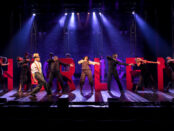Derek McLane
Derek McLane is a Tony Award and Emmy Award winning set designer. Recently designed the 2013 and 2014 Oscars, as well as NBC’s Sound of Music, Live. Opera and theatre designs in London, Paris, Dublin, Glasgow, Moscow, Krakow, Sydney, and Warsaw. AWARDS: Winner of 1997, 2004 OBIE Awards, 2004, 2005, 2007 Lucille Lortel Awards; 2009 Tony Award, 2011 Drama Desk Award, 2013 Emmy Nomination. He is member of the board of directors of the New Group and a mentor with TDF’s Open Doors program. For more info on his career visit http://derekmclane.org/pages/history.html
“Glitter and Be Gay” is not just a Leonard Bernstein aria from Candide, but the perfect description of the campily funny new musical "Death Becomes Her" which just hit the Lunt-Fontanne Theatre like a friendly tornado. Double entendres explode in all directions. Take the song titled “For the Gaze,” as a tongue-in-cheek example. Based on the 1992 film of the same name, the creators of the musical—Marco Pennette (book), Julia Mattison and Noel Carey (music and lyrics)—have taken the smarmy, star-studded film and turned it into an entertaining, equally star-studded musical. [more]
The Heart of Rock and Roll
"The Heart of Rock and Roll" at the James Earl Jones Theatre is one of the more pleasant entries in the jukebox musical derby. Using the musical catalog of Huey Lewis and the News, Tyler Mitchell and Jonathan A. Abrams, (book by Abrams), have fashioned an amusing story of a working class Joe who is torn between his love of rock music and his need to make a living in business. Heart began its Broadway-bound journey in 2018 at the Old Globe in San Diego, but is set firmly in the 1980’s. [more]
The Seven Year Disappear
While "The Seven Year Disappear" may challenge and confuse many theatergoers, people used to performance art may get the in-jokes. Jordan Seavey whose play "Homos, or Everyone in America" was seen in 2016 in the Labyrinth Theater Company at the Bank Street Theater is a sophisticated, seasoned playwright and he and director Scott Elliott make no concessions to their audience. "The Seven Year Disappear" may be most appreciated by devotees of experimental theater but it does make one hungry for Seavey’s next play. [more]
Purlie Victorious: A Non-Confederate Romp Through the Cotton Patch
In 1961, Ossie Davis channeled the hurt of growing up in segregated Georgia into "Purlie Victorious: A Non-Confederate Romp Through The Cotton Patch," humorously attacking the cause of his suffering rather than giving into it. A Broadway revival of the play, the first since those heady days of the modern Civil Rights Movement, is a current reminder that it's possible to smile through the pain. That it's a needed one is the tragedy. [more]
The Seagull/Woodstock, NY
Aside from the problem of which translation from the Russian to use, the thorny problem with American productions of the plays of playwright Anton Chekhov is how to deal with the fact the author himself called them comedies but everyone from his early director Konstantin Stanislavski on has seen them as tragedies. Playwright Thomas Bradshaw has neatly solved both problems: in his new adaptation renamed "The Seagull/Woodstock, NY" which recasts the play as an updated modern comedy, he also made the play a very funny satire of today’s culture vultures, thespians and the literati. His version in which all of the names have been Anglicized makes Chekhov’s turn-of-the-last century play very accessible to contemporary audiences which is not often the case with Chekhov adaptations - without making drastic changes. In doing so, it makes whatever parody there was in the original of theater and literary icons of Chekhov’s time now understandable to today’s audiences due to updated references they can recognize. [more]
Almost Famous
What Crowe has done in writing his own book for the new show is recreate almost exactly every scene in the movie starting from the time when 15-year-old hero William Miller meets rock critic Lester Bangs, including the bus and plane sequences. The best lines in the stage version are recognizable from the film and nothing of equal stature has been added to the version now on stage at the Bernard J. Jacobs Theatre. The new songs credited to composer Tom Kitt with lyrics by Crowe and Kitt add little to the work as they do not forward the story. A good many of the iconic songs from the film make their appearance but as staged by director Jeremy Herrin and choreographer Sarah O’Gleby they are the least effective numbers in the show. [more]
Black No More
"Black No More," the new musical inspired by George S. Schuyler’s 1931 Afrofuturist novel, is the most exciting and inventive new show to be seen so far this season in New York though it is still in need of work. With a book by Academy Award-winning screenwriter John Ridley (12 Years a Slave), the stage version drops Schuyler’s scathing satire of Harlem Renaissance and Depression figures as well as its political election hijinks for a more direct story about race and racism in the United States. As brilliantly staged by Scott Elliott for The New Group, Black No More is also a play of ideas and will keep you thinking and debating long after the final curtain in this story of the sacrifices people have to make to change the world. [more]
MJ
Wheeldon and Pulitzer Award-winning playwright Lynn Nottage make every effort to hide the fact that MJ is a jukebox musical, despite the fact that the first notes of every song elicited loud shouts and applause (part of the reason the show runs two and a half hours). Nottage has invented a plodding framework for the show. It is 1992 in Los Angeles. TV reporter, Rachel (a down-to-earth Whitney Bashor who acts as the play’s Greek chorus) and her hyperactive assistant, Alejandro (a charming Gabriel Ruiz) corral a reluctant Jackson to have his rehearsals for his huge upcoming 'Dangerous" tour documented. [more]
The Tap Dance Kid
Let’s start with the best: The great Joshua Henry’s 11 o’clock number, “William’s Song,” a gut-wrenching revelatory song sung by the title character’s emotionally distant father. Henry endows the number with the emotional punch of “And I Am Telling You” from "Dreamgirls." Since Henry Krieger wrote the music to both songs the striking similarity is understandable. Of course, Tom Eyen wrote the "Dreamgirls"’ vivid lyrics and librettro; Robert Lorick wrote the words for the pleasant, plot-moving score of "The Tap Dance Kid." "The Tap Dance Kid"—book by Charles Blackwell, based on the novel "Nobody’s Family Is Going to Change" by Louise Fitzhugh—is a simple domestic tale now reset in the 1950’s, gussied up with the brilliant tap choreography of Jared Grimes and the keen, vivifying direction of Kenny Leon. But, even under Leon’s artful hand and Grimes’ beautifully performed numbers, "The Tap Dance Kid" remains a defiantly unimaginative story. [more]
Bob & Carol & Ted & Alice
Bookwriter Jonathan Marc Sherman has wisely kept the story in its period. However, his dialogue is almost word for word lifted from the screenplay which is rather old hat for those of us have heard it in the movie. The score with music by Sheik and lyrics by Sheik and Amanda Green makes all the songs sound the same in Sheik’s orchestration played by a combo of four. The lyrics are both pedestrian and trite, telling us only what we already know. The songs which are not listed in the program include a great many reprises. Many of the tableaux and setups recreate exact visual moments from the film. [more]
A Soldier’s Play
David Alan Grier, Blair Underwood and Billy Eugene Jones in a scene from Charles Fuller’s “A [more]
Moulin Rouge! The Musical
As the romantic, tubercular and charismatic Satine, the magnetic Ms. Olivo delivers a ferocious, sensual and grandiose performance that’s one of the most memorable recently seen on Broadway. Her sensational characterization is more Eartha Kitt than Nicole Kidman and all her own. Clad in slinky costumes, the voluptuous Olivo perpetually dazzles. Her titanic singing and dancing is matched by her intense acting which grounds the busy production with riveting focus. Her “Diamonds are Forever” is spellbinding and there’s saucy humor when it’s followed by “Diamonds are a Girl’s Best Friend,” “Material Girl” and “Single Ladies.” [more]
Happy Talk
Abrasive as a subpar episode of Maude and reaching a sour psychological thriller-style finale out of Craig’s Wife, Happy Talk is playwright Jesse Eisenberg’s muddled family drama. It’s the 1990’s and the New Jersey Jewish matron Lorraine is playing Blood Mary in a community theater production of South Pacific and so in addition to the jokey title we get a barrage of painfully cute musical comedy references. Scene transitions are accompanied by blaring snippets of Mitzi Gaynor who played Nellie Forbush in the film version. The combination of Mr. Eisenberg’s smug sensibility, inane contrivances, shtick-ridden dialogue, condescended-to characters, and slack construction all make it a tiresome one hour and 45 minutes. [more]
Burn This
For one thing, it takes far too long for Pale, Wilson’s most outrageous and flamboyant creation, to arrive on the scene. (Malkovitch was Pale in the original production and Adam Driver is Pale now, with different but equally effective results.) For another, the premise of the play requires Anna to be overly reserved and subdued, in contrast with Pale’s constantly explosive character. The customarily sure-fire director Michael Mayer somehow seems to have accentuated those problems with lethargic consequences. [more]
Merrily We Roll Along
Usually considered one of Sondheim’s lesser musicals, albeit with one of his best scores--and needless to say, that’s saying a lot--this production provides a heft and a story that are sorely lacking in previous versions. There is no denying or gainsaying its power to impress, as each and every song comes through with its capacity to build characters and tell stories. If the stories are less than satisfying in earlier productions, that’s due more to bookwriter George Furth (adapting the original play by George S. Kaufman and Moss Hart) than to Sondheim or to his other collaborators, each of who has provided an impeccable contribution to the current enterprise. [more]
American Son
“That’s it?” is likely to be one’s reaction at the conclusion of playwright Christopher Demos-Brown’s tidy topical 90-minute racial drama "American Son." Theater enthusiasts often rhapsodize about Broadway’s Golden Age, the 1920’s to the 1960’s, when straight plays filled theaters. Mr. Demos-Brown’s effort does harken back to that era by crafting a well-constructed minor vehicle for actors of the sort that could have played a season, then toured, was made into movie and was forgotten. Kerry Washington and the fine cast make the most of their choice roles under Kenny Leon’s solid direction. [more]
The True
If these characters sound familiar, they are based on real people who populated Albany politics four decades ago. "The True," a world premiere play by Sharr White ("The Other Place," "The Snow Goose") gives four-time Emmy and two-time Golden Globe Award winner Edie Falco another bigger-than-life role and she is magnificent. The cast also includes television stars Michael McKean (Mayor Corning) and Peter Scolari (Peter Noonan) as well as Glenn Fitzgerald (Howard C. Nolan) and John Pankow (Charlie Ryan) who under the direction of The New Group’s artistic director Scott Elliott create a true ensemble, making us feel that these people have lived their roles. [more]
Gettin’ the Band Back Together
If the show plays like it was written by a committee, in fact, it has been. The book is by producer/ writer Ken Davenport and The Grundleshotz who turn out to be a group of performers and writers who originally workshopped the show in a series of improvised rehearsals. For the record, they are Sebastian Arcelus, Fred Berman, Michael Hirstreet, Jenna Coker Jones, Craig Jorczak, Nathan Kaufman, Emily McNamara, Jennifer Miller, Bhavesh Patel, Sarah Saltzberg (who is credited with additional material), Michael Tester, as well as Jay Kaitz who plays the second male lead in the show, Bart Vickers as though he were auditioning for Dewey, the laid-back music teacher in "School of Rock." [more]
Children of a Lesser God
A regular on the television series "Dawson’s Creek" and currently appearing on "The Affair," the affable Joshua Jackson plays James. Mr. Jackson’s talents are not showcased in this production. Jackson’s speech pattern is monotonous and his lack of sensuality makes the attraction between him and Sarah less than palpable. He gets through the role with professionalism but with little impact. Others in the cast make up for this void but the vacuum of implausibility looms. [more]
Good for Otto
Except for the frustration level of the characters, there does not seem to be a movement towards change or catharsis which may partly explain why the play seems so long. Harris and Madigan retain their cool as therapists throughout until almost the end when they can’t hold in their emotions any more. The most dramatic story is that of 12-year-old Frannie beautifully and realistically played by young Rileigh McDonald. However, as written the role of her foster mother played by Rhea Perlman is a one-note tale and doesn’t give her much wiggle room to make it her own. [more]
Jerry Springer – The Opera
"Jerry Springer - The Opera" is not for opera purists nor is for people who are easily offended by four letter words and other bad language of which there is a multitude. However, its irreverence skewers social, religious and political hypocrisy. The New Group’s production directed by John Rando is one of the most exciting musical theater experiences to be currently obtained in New York. It actually seems more relevant in Trump America where this sort of thing is cable-fodder every night of the week. If you are a dedicated theatergoer, miss this show if you dare. [more]
Cardinal
Greg Pierce, the author of "Slowgirl" and "Kid Champion," has often tackled hot button issues. Here in Cardinal being given its world premiere at Second Stage Theater, he takes on urban renewal, Chinese entrepreneurs, racism and amateurs in politics, all worthy of investigation, in comic fashion. However, in this satire his plot seems to reinvent itself in every other scene, with twists and turns you can’t see coming. The three sets of characters (Lydia and Jeff, Nancy and Nat Prenchel, owners of the Bread & Button Bakery, and Chinese businessman Li-Wei Chen and his son Jason) seem totally separate until he brings them together in a rather improbable finale. He also loads the deck with such plot complications as Lydia and Jeff beginning an affair (as she looks so much like her sister who he dated in high school and hasn’t gotten over.) [more]
Downtown Race Riot
Anton Chekhov once advised that if you show an audience a gun you are required to have it go off. Set on September 8, 1976, Seth Zvi Rosenfeld’s new play, "Downtown Race Riot," being given it world premiere by The New Group, never takes us to this forgotten event which happened in Washington Square Park but depicts the forces and people involved in the 100 minutes before the riot is to happen. This overheated melodrama which goes on a bit long takes on many important themes (racial hatred, drug addiction, petty crime, sexual identity, financial insecurity, etc.) without making any pertinent point about any of them. While the dialogue and the milieu are gritty, Downtown Race Riot recycles a great many stereotypes and clichés. [more]
The Parisian Woman
Inspired by Henri Becque’s notorious 1885 "La Parisienne," credited as the first Naturalistic French play, Willimon has taken its plot, characters and themes of sex, adultery, betrayal and power. To this he has added modern politics as it is being practiced in Trump’s Washington. Tom, a high-powered Beltway tax lawyer who works with both Democrats and Republicans, and Chloe, his socialite wife, are in an open marriage. While she is attempting to break up with her lover Peter, a banker, Tom asks for his help in getting the nomination for an appointment on the circuit court though he has never been a judge before. When it looks like Tom is no longer in the running, Chloe decides to act on her own and approaches her new friend Jeanette, the President’s choice for Chair of the Federal Reserve, a staunch Republican power broker and contributor. How this plays out shows the ins and outs of Washington negotiating. While none of this is particularly new, Willimon uses some of the latest contemporary wrinkles. [more]
The End of Longing
Mr. Perry has certainly followed the maxim, “write what you know.” We follow the romantic and personal travails of four stereotypical, contemporary Los Angles types who have the financial resources for incessant self-examination. It’s a universe of meet cutes, overwrought emotional exchanges and happy endings. [more]
The Whirligig
Say this for actor Hamish Linklater: he writes juicy parts for his fellow actors. He also knows how to set up a sense of community. The New Group production directed by its artistic director Scott Elliott has a fine cast led by two-time Tony Award winner Norbert Leo Butz and Zosia Mamet, just off six seasons of the recently ended HBO television series, Girls. [more]
Gently Down the Stream
In between the scenes between the two men in Beau’s living room, Rufus records Beau’s reminiscences of his life and times. In this way, Sherman gives us a review of what things were like for gay men from 1940 up to the present, from the stories Beau had been told about the war years to his own personal and painful experiences from 1960 on. Beau’s memories include gay life in New Orleans, New York, San Francisco, Paris and London and cover police brutality and the rise of AIDS. Besides being flattered to be asked to tell his story, Beau also want to pass on his experiences to the next generation who have had its easier. While the play becomes schematic alternating scenes between the two, Fierstein is so convincing in these authentic but surprising tales of the past that it never becomes simply a device. [more]
The Price
Maybe “fireworks” is too strong a word for a production that is more of a slow burn. The play begins when Mark Ruffalo, as Victor, walks up, into the top floor of the home his family was consigned to, when the Great Depression of 1929 hit and their father lost his fortune. The essence of the conflict between Victor (a policeman) and Walter (a doctor) boils down to economic inequality. (As Walter says to Victor, “It’s very complicated between us.”) Though they both grew up with a chauffeur, the older Walter went on to a successful career while Victor stayed behind to care for their father when everything was lost during the Depression. [more]
If I Forget
Steven Levenson’s "If I Forget" is the kind of family drama that doesn’t get written much anymore: one that has something to say other than just depicting a dysfunctional situation. Not only are we pulled into the family wrangling, the issues under debate are major ones and their outcome is serious business. Director Daniel Sullivan and a splendid cast of seven make this one of the most compelling plays of the season. This is a play you won’t soon forget and its provocative nature should trigger much discussion. [more]
Evening at the Talk House
However, as the title implies it is also a very verbose, long-winded affair giving an excellent cast made up of such veterans as Matthew Broderick, John Epperson (a.ka.a Lypsinka), Jill Eikenberry, Larry Pine, Claudia Shear and Michael Tucker not much to do. Shawn has written the best role for himself but that is not saying much. While the play may be meant as a cautionary tale, it is also over-written and self-indulgent. Long before you realize where the play is going you may have lost interest due to all the explanations. [more]
Sweet Charity
The real reason to see the new "Sweet Charity," its third major New York revival, is for Sutton Foster’s bravura performance. Aside from nightclub singer Reno Sweeney in Anything Goes, Foster has usually played innocent, clean-cut young women caught up in unusual situations. Here she again plays to type – but with a difference: Charity Hope Valentine works as a taxi dancer in a New York dance hall, a sleazy environment. However, she keeps her infectious innocence and her indomitable spirit despite one unfortunate romantic encounter after the other due to her gullibility. Under Leigh Silverman’s direction, Foster may just be the most convincing actress to ever play Charity. [more]
Love, Love, Love
British actor Richard Armitage making his New York stage debut and Tony and Academy Award nominee Amy Ryan work hard to make Kenneth and Sandra three-dimensional, likeable people, but, as written by Mr. Bartlett, their crassness is the fatal flaw in "Love, Love, Love." Why should we enjoy spending so much time with two people who so adroitly care only for themselves? [more]

































